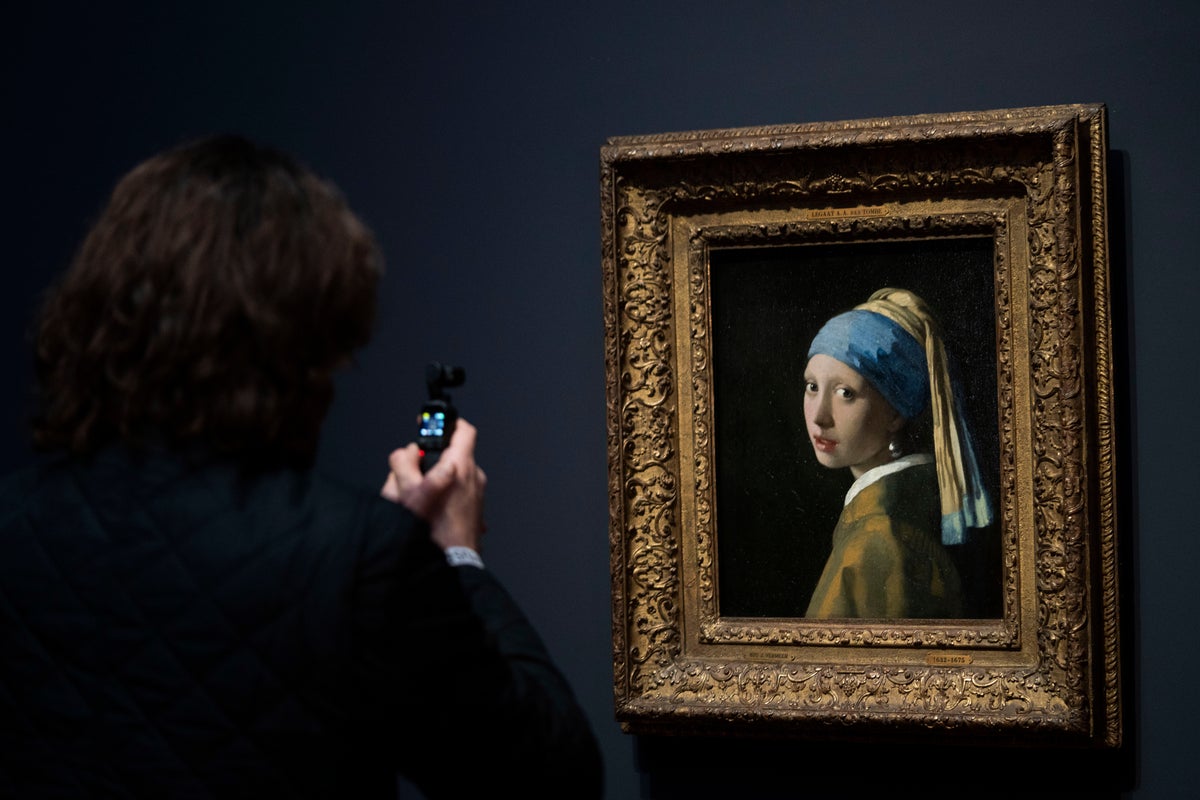
Some art lovers make it a mission to visit and view as many works as possible by 17th-century Dutch master Johannes Vermeer.
Starting Friday, the Rijksmuseum in Amsterdam is making their lives a whole lot easier.
A blockbuster exhibition at the Netherlands' national museum of art and history brings together 28 of Vermeer's paintings from seven countries around the world. Not bad considering only 37 paintings are generally ascribed to the artist who lived from 1632-1675 in the city of Delft.
Never before have so many Vermeer works been put on show together in a single exhibition. Seven of the paintings haven't been in the Netherlands in more than two centuries.
Rijksmuseum General Director Taco Dibbits believes the exhibition provides a chance for visitors to immerse themselves in the exquisite interior scenes for which Vermeer is best known including “Girl with a Pearl Earring” and “The Milkmaid,” but also early religious paintings and two cityscapes, both depicting his home town, Delft.
Looking at the beguiling simplicity of “Mistress and Maid,” one of three paintings loaned for the show by New York’s The Frick Collection, Dibbits said it “radiates this tranquility, this ideal world.”
Vermeer's use of light — often coming from a window situated on the left of the canvas — the bold colors and meticulous composition can be seen throughout the exhibition.
“Vermeer has this quality of kind of everything is perfect. Everything falls in place," Dibbits said. "There’s perfect happiness in his scenes. There’s tranquility, there’s intimacy.”
Vermeer earned the nickname “The Sphinx of Delft” because so little was known about him — he left behind no letters or diaries and there are no known portraits of him. But recent research has begun to unravel the mysteries of the painter. Studies being carried out around the exhibition are further broadening knowledge about his work.
“We’re really coming closer to Vermeer than we’ve ever been,” said Pieter Roelofs, the Rijksmuseum’s Head of Paintings and Sculpture. Recent research means that “we really understand more about his life, about his household, about his direct contacts, the people for whom he made these paintings, and what they mean,”
In preparation for the exhibition, the museum has been taking an extremely close look at its own Vermeer paintings, which include iconic “The Milkmaid.” High-tech scans that peer through the surface of the work have revealed that Vermeer tweaked the background as he painted, apparently to ensure that the focus shone solely on the woman pouring milk. A jug holder – similar to a wall-mounted coat rack – that was originally in the background was painted over.
Tracy Chevalier loved another of Vermeer's best-known works — “Girl with a Pearl Earring” — so much so that she wrote a novel about it that was in turn made into a film starring Scarlett Johansson and Colin Firth.
Chevalier was at a preview of the exhibition on Monday taking in that painting and the other 27 on show in a suite of 10 galleries.
“I think the curators really understood that for him, less is more. And I feel that way too; that you don’t need lots and lots of stuff. So this exhibition only has 28 paintings, but 28 is perfect because you have the space and the time to really take in each one."
“Girl with a Pearl Earring” only had to make a short trip from the Mauritshuis museum in The Hague, and isn't sticking around until the end of the exhibition. She returns home after March 30.
Other masterpieces have had a longer journey for the exhibition that has been some eight years in the making.
"Officer and Laughing Girl," “Mistress and Maid” and “Girl Interrupted at her Music” flew from the U.S. East Coast, leaving the Frick Collection while the New York museum undergoes restoration. That paved the way for more museums to loan paintings to the exhibition. More works come from The Metropolitan Museum of Art and The Leiden Collection in New York. The National Gallery of Art in Washington, which, together with the Mauritshuis, staged the last major Vermeer retrospective in 1995-96, also sent paintings.
In total, the 28 paintings come from 14 museums and private collections in seven countries.
With such a comprehensive retrospective, the paintings that aren't in Amsterdam almost become almost as noteworthy as those that are. A few of the 17th-century works are so frail that they simply can't travel. One painting — “The Concert” — didn't make it to Amsterdam because it is among 13 artworks still missing after being stolen from the Isabella Stewart Gardner Museum in Boston in 1990 in one of the world's most notorious art heists.
The show in Amsterdam opens Friday and runs to June 4. It has already become the Rijksmuseum's most in-demand exhibition — Dibbits said the museum has so far sold nearly 200,000 tickets and has extended opening hours to accommodate more people.
For art lovers who can't get to Amsterdam or snag a ticket, there is already a digital show available narrated by Stephen Fry.
Online viewers can zoom in on minute details of ultra-high resolution photographs of some Vermeer paintings to see what makes his work stand out.
“I think for Vermeer, light is color, and color is light ...," Roelofs said. "And I think one of the things we will see is how how he really knows how to focus — and that makes him really exceptional.”







